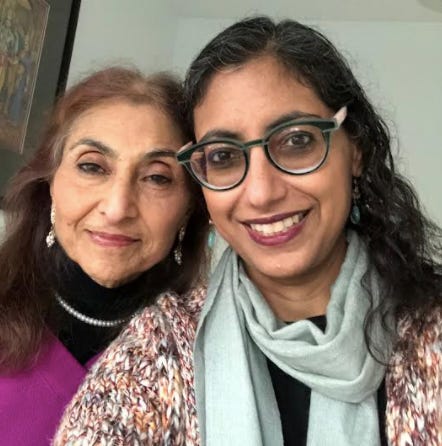Rapunzel No More
At 49, Sejal Shah makes peace with the mid-life hair loss her mother and grandmother—and so many other women—have faced before her.
For the first quarter of my life, I was known as long-haired Sejal. I could sit on my hair. In our small city, I was one of four Sejals and, growing up in a patriarchal culture, we often were referred to by our father's names to clarify which person it was: I was Ashok Uncle ni Sejal. Ashok Uncle's Sejal: my father's daughter.
But the truth is I was always my mother's child. I preferred her to all others. My favorite uncle would visit when I was young, driving five hours from Pittsburgh. He was my favorite uncle, but he said I didn't like to go to anyone else. I wanted my mother. I remember that. My favorite uncle wore glasses with Coke bottle lenses, thick, like mine.
In her teenage years, wedding pictures, and early working years, my mother had long, long hair, a curtain of hair, falling in a splendor. People remarked on it. She was known for it. It was remarkable. I had long hair too, but for a shorter amount of time. I cut my hair to below shoulder length, but well above my waist, in middle school.
When I run my fingers through my hair, a kind of comb, untangling it from the bun or ponytail or braid it's usually in, a cloud of hair fills my palm. It's unsettling.
Even in middle school, my mother insisted on coconut oil and two long braids for me, just as she had worn her hair in Nairobi. Coconut oil, long hair, and winter swim classes (gym!) in glacial Western New York did not go over well for me in middle school. We had to take the bus from our middle school to the high school across town, where the pool was, and my braids froze.
What I would do to have a thick braid now! I look in the mirror in the morning and find myself thinking what I've heard my mother say: I don't even like to look in the mirror anymore. My hair has thinned out: wispy, sad, grey. I wear it back, which I did when it was longer and thicker, too. But it's not thick anymore. When I run my fingers through my hair, a kind of comb, untangling it from the bun or ponytail or braid it's usually in, a cloud of hair fills my palm. It's unsettling.
Some of my hair loss may be a side effect of lithium. I had more hair a year ago. Is my mental health worth more than my hair?
My mother used to complain that she had lost so much hair, that hers had thinned out. It all seemed like vanity until my hair started thinning. I think it must have been hard for my mother because she was a great beauty. It also turns out I don't like losing my hair. Who likes losing their hair? No one. But I didn't think it would happen to me.
Some of my hair loss may be a side effect of lithium. I had more hair a year ago. Is my mental health worth more than my hair? It's a stark choice. I chose health, but losing my hair has been a possible consequence. I know lots of people lose their hair. I knew I was predisposed because of my maternal grandfather, my mother, and one of her brothers. But her other siblings have thick hair—have more hair.
Genes: you don't know how it's going to work out.
Sometime in her thirties or forties, large brown sun spots bloomed across my mother's face. She warned me to wear sunscreen and hats. I didn't listen. I was young. I am darker and assumed melanin would protect me. It seemed vain to worry about your skin. Now my brother and I both have spots. But he's male; what his skin looks like doesn't matter in the same way.
My mother's mother's hair also thinned out…She became a grandmother on her 44th birthday—a strange thing to realize as someone who is not a parent, who still feels like a daughter more than anything else.
Why does it matter so much what women look like? Hair, skin, I tire of it. Now, for the first time since middle school, I'm again wearing glasses all the time. Glasses hide the sun spots a little, but I'm a different person with spectacles. I've worn them since I was 6, switching to contacts at 13. But when I started to need reading glasses on top of bifocal contacts, I gave up. I am glad to offer up my bookishness, but sometimes it shocks me: what I look like in glasses. I am different.
When I got my first pair of glasses, my mom cried. They were not cute, but they helped me to see and read. Why does what a girl looks like matter so much? My new frames are dark green with pale pink temples. The colors are accent and distraction. But there's that thinning hair, frizzing, middle-aged lady hair. I wish I had appreciated my too-thick hair when I had it. I wish I had worn hats and sunscreen earlier. I wish, I wish.
My mother's mother's hair also thinned out, but she was our matriarch. She became a grandmother on her 44th birthday—a strange thing to realize as someone who is not a parent, who still feels like a daughter more than anything else. My grandmother died well into her nineties, and I recall braiding her thinned hair as we prepared her body for cremation. A renowned cook, her power and beauty were not tied to her hair. I am not renowned for my culinary skills despite cooking lessons with Ba. I should have more with my mom. Earlier this week, my mother asked if she could take the pumpkin from my house. She came back later that week (while dropping my father off at chemo) with some pumpkin shaak for me. My mother's hair has thinned out, but she's still cooking and taking care. What does it matter how thick her hair is?
Now, I heat coconut oil in the microwave, pour it into my palm and rub it into my scalp. I keep it overnight to let the oil soak in, or just wait a few hours and then wash my hair. They were onto something, my mom and Ba.
I don't recognize myself in the mirror. Mirror, mirror on the wall, who's the fairest of them all? Well, it was never me—but you know, I have my charms.







This was so moving, Sejal. Thank you!
I think there's something called pandemic hair loss. In any case, mine has come out in great, dry tangles. It's disturbing because it's progressive. I have the sense that one day I'll wake up and there won't be "a hair on my head."